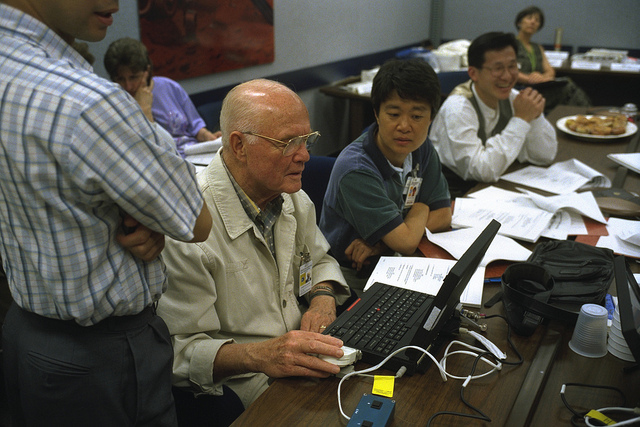The Digital Democracy Commission report is about far more than just digital
The Speaker’s Commission on Digital Democracy recently reported, recommending amongst other things that online voting be introduced in time for the next General Election. One of the Commission’s members, Cristina Leston-Bandeira, highlights the key elements of the report, and expresses hope that real change could be afoot.

Credit: NASA, CC BY NC 2.0
After a year of extensive consultation across the country through a variety of means and amongst very different communities, the report of the Speaker’s Digital Democracy Commission (DDC) has been published. The report entitled Open Up! seems to have been well received and I hope it will lead to effective changes. Although the headlines have focused on online voting (as is to be expected), many people have realised that the report is about far more than that; in fact online voting is a minute part of the report. The DDC’s report is essentially a call for better and more effective engagement between parliament and public.
Although the DDC’s main remit has been to explore how technology can help us enhance our parliamentary democracy, it has been clear from the start that digital is not a fix – digital can provide the means to do some things more effectively, but on its own it achieves nothing. It can in fact increase isolation and polarise views. The DDC has been acutely aware of this from the start. And as we listened to evidence from many different quarters, this has become even more apparent. The key issues that have kept coming back to the fore have related to the ability of the public to understand and access parliament. Illustrative of this is the number of times people mentioned parliamentary language as a key barrier to understanding.
This is why the report has such a strong focus on engagement and education. The report tries to show how simple changes could enhance public engagement with parliament. Some of these are already taking place – though mostly unknown to many of us – such as our recommendation that parliament should go where people are. Parliament already does this – be it through MPs’ constituency work, be it through Select Committees or the Parliamentary Outreach Service. In many ways, the report simply signals the importance of some of the activities being already experimented with and asks for more.
The report also recognises that whilst elections are the crucial legitimising foundation of parliament, there are also plenty of other forms of participation and engagement with the parliamentary process in between elections. As I explored in this paper, the 21st century parliament is a Mediator Parliament – one that plays a key role in mediating issues between the public and governance. The context of the Mediator Parliament is one of an informed and critical citizenry and one of considerable political fragmentation where it is increasingly difficult to address the highly diverse and volatile views of the public. Strengthening the capacity of engagement between elections enables more effective mediation.
But the report also recognises that not everyone is necessarily interested in engaging and/or participating in between elections. Many of us are quite happy only participating every five years through our vote – though many of us don’t actually even do this. With its emphasis on education and actively reaching out to disengaged communities, the report suggests the reinforcement of effective information about parliament; so that, should the public wish to, they know where to access the tools to participate. As I said in a blog for the PSA last week, “It is not just about facilitating engagement, it is also about engendering a social capital that includes the awareness of one of our key political institutions.” Hence the report’s emphasis on education, but also on strengthening engagement through issues – people participate because/when they care about an issue; not necessarily because they want to participate politically. For the sake of an issue that matters to them, not for the sake of participating.
A great strength of the Digital Democracy Commission has been its composition. We, eight Commissioners, come from very different backgrounds. From Femi Oyeniran, a film actor and director, to Helen Milner, the CEO of the Tinder Foundation, we cover very different areas of activity. This has meant that we have brought different ideas and links to different types of communities. This matters because it has helped the DDC to discuss and listen genuinely to very different types of voices. This is reflected in the report.
It is reflected, for instance, in the fact that the report talks to different audiences – all concomitantly. The report is not just about digital or just about parliament; likewise it is not just about representative democracy or just about participative democracy. It talks to these different communities, bringing these ideas together. It shows that digital is meaningless without thinking of the context of parliamentary processes; and that enabling forms of participation doesn’t bring into question the legitimacy of representative democracy (on the contrary). It is about bringing all of these together. It recognises that digital in itself is not a fix, but can act as a powerful facilitator and make our representative democracy more effective and inclusive.
If you haven’t yet, I’d strongly encourage you to read through the report. It is divided into 13 chapters and it touches many areas of parliamentary business, engagement and actual technology. For those of you into geeky data (;)) try the chapter that asks for open data. Though in fact this is not just for geeks – having open data is the first step to being able to develop many platforms for different purposes about parliament, helping to develop much better information about the institution in a far more flexible way and suiting different audiences, in a far more effective way than parliament could ever do as an institution. For those of you who worry about digital exclusion, you should read this chapter. If, however, your thing is about widening opportunities for genuine participation, then this chapter goes through a few ideas that may interest you, such as direct participation in the law-making process, enhancement of e-petitions and how Select Committees have already being harnessing the potential of social media to involve the public in their deliberations. If you happen to be a parliamentary assistant and know how challenging it currently is for MPs to manage digital communication effectively, then the chapter on skilling up may be of interest to you.
Regardless of your main area of interest, do have a read of the report and let the DDC know what you think. It’s been a true privilege to be in the Digital Democracy Commission – I hope that many of you do read its report and embrace the changes this could bring to our parliamentary democracy.
—
Note: this post represents the views of the author, and not those of Democratic Audit, the LSE, or the Speaker’s Commission on Digital Democracy. Please read our comments policy before posting.
—
 Cristina Leston-Bandeira is Professor of Parliament at the University of Hull. She is a member of the Speaker’s Digital Democracy Commission. She tweets @estrangeirada
Cristina Leston-Bandeira is Professor of Parliament at the University of Hull. She is a member of the Speaker’s Digital Democracy Commission. She tweets @estrangeirada





 Democratic Audit's core funding is provided by the Joseph Rowntree Charitable Trust. Additional funding is provided by the London School of Economics.
Democratic Audit's core funding is provided by the Joseph Rowntree Charitable Trust. Additional funding is provided by the London School of Economics.
The Digital Democracy Commission report is about far more than just digital https://t.co/66kAQNL2PB #risalahe
Good articles ! I have been involve in promoting DD
The Digital Democracy Commission report is not just about digital https://t.co/SpLShkgDuv
The Digital Democracy Commission report is not just about digital https://t.co/5t7qruYLID @democraticaudit
The @digidemocracyuk Commission report is about far more than just digital says @estrangeirada https://t.co/SG2Jz29EMw
The Digital Democracy Commission report is about far more than just digital https://t.co/oQtZO9k2Pb https://t.co/QMfcWSxUT5
RT @democraticaudit: The UK Digital Democracy Commission report is about far more than just digital https://t.co/R2kKNRWA3O
The Digital Democracy Commission report is about far more than just digital https://t.co/RtILH7CvZS